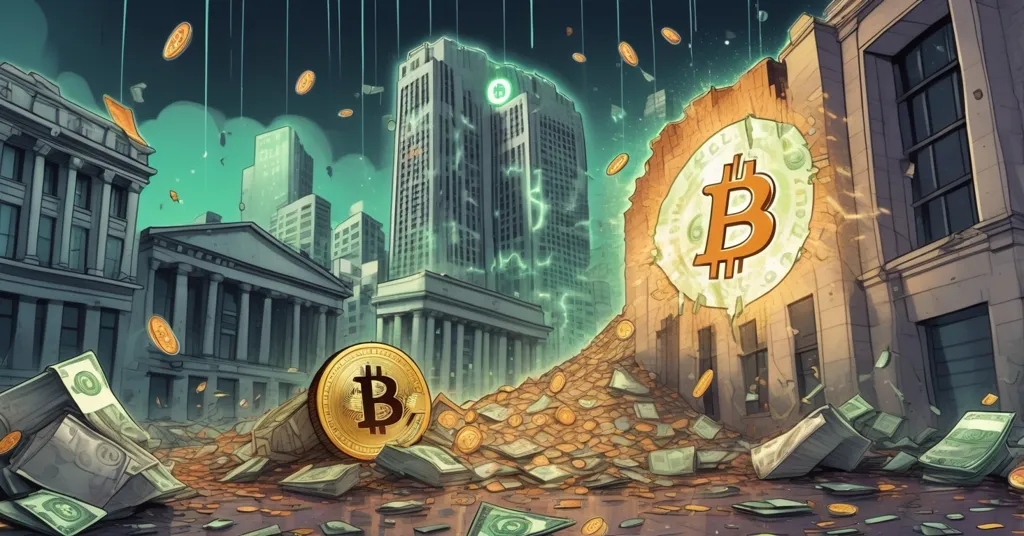Argentina’s Central Bank Cuts Reserve Rules: Economic Fix or Bitcoin Adoption Trigger?

Argentina’s Central Bank Eases Reserve Rules: A Tepid Fix Amid Economic Chaos—and a Bitcoin Wake-Up Call
Argentina’s central bank, the BCRA, has rolled out a subtle policy shift, cutting daily reserve requirements for commercial banks from 100% to 95% to inject some much-needed liquidity into an economy on life support. With inflation scorching past 211% in 2023 and credit tighter than a drum, this is a cautious play to spur lending without tanking the already fragile peso. But here’s the real kicker: in a nation where financial trust is a cruel joke, could this half-measure push more Argentines toward Bitcoin and decentralized alternatives?
- Policy Change: Reserve requirements drop from 100% to 95%, freeing up minimal capital for lending.
- Economic Crisis: Argentina faces 211% inflation and a credit freeze crippling businesses and households.
- Crypto Angle: Persistent instability fuels Bitcoin adoption as a hedge against currency collapse.
The Policy Shift: A Band-Aid on a Gaping Wound
For those new to the game, reserve requirements are the funds banks must keep locked away—essentially a safety net to prevent over-lending and financial implosion. In Argentina, banks have been choked by a draconian 100% daily reserve rule, meaning they had to hold every peso of required reserves each day, leaving almost nothing to lend out. This new 5% reduction is a tiny crack in the wall, theoretically freeing up a sliver of capital for loans to struggling small businesses or households. Picture a clogged pipe finally dripping a few drops—that’s the level of relief we’re talking about. For a typical mid-sized bank, this might unlock a few million pesos, potentially enough for a handful of small loans, but hardly a game-changer.
Banks have been screaming for this kind of flexibility, hammered by triple-digit interest rates on peso-based assets—think savings accounts or loans tied to the local currency—that make lending a losing bet. High rates, meant to curb inflation, instead gut bank profits and deter borrowers, leaving the economy stalled. The BCRA’s tweak, as reported in recent updates on Argentina’s banking policy changes, is a response to this pressure, but don’t mistake it for boldness. Many in the banking sector wanted a full shift to monthly reserve compliance for real breathing room. Instead, they got a crumb, and the jury’s out on whether it’ll move the needle.
Argentina’s Economic Hellscape: A Breeding Ground for Disruption
Step back, and the bigger picture is a nightmare. Argentina’s inflation hit a staggering 211% in 2023, among the highest globally, while the peso’s value evaporates faster than morning dew. This isn’t new—flash back to the 2001 debt default, when savings vanished overnight, and trust in the system crumbled. Today, tight liquidity (a fancy way of saying there’s no cash flowing) has banks halting mortgages and loans as delinquencies soar and profit margins shrink to nothing. Small businesses can’t pay staff, families can’t borrow to survive, and the ripple effects are brutal.
The BCRA’s caution makes sense on paper. Pump too many pesos into the system, and you risk fanning the inflationary flames or sparking another currency nosedive—something Argentina knows all too well after multiple crises. So, while banks begged for looser rules, the central bank is tip-toeing like it’s defusing a bomb. Fair play, given the stakes, but when your house is already burning, fiddling with the thermostat feels like a sick joke. Some might say it’s time for a fire hose—or better yet, a decentralized escape hatch like Bitcoin.
Javier Milei’s Libertarian Surge: A Spark for Change?
Enter President Javier Milei, a self-styled libertarian firebrand whose party just dominated midterm elections, snagging both chambers of parliament. His victory has markets cautiously optimistic, fueled by his savage critiques of traditional financial systems and promises of radical reform. This reserve tweak isn’t directly his doing, but the timing screams influence—a small nod to economic relief while his administration flexes its newfound muscle. Milei’s anti-establishment vibe jives with those of us rooting for decentralization and disruption, especially his disdain for centralized control.
But let’s not get starry-eyed. While Milei’s rhetoric aligns with the spirit of effective accelerationism (e/acc)—the idea that crises speed up adoption of game-changing tech like blockchain—some in the crypto crowd remain wary. Government reforms, even from a maverick, often just repackage the same old centralized failures. Could Milei surprise us with pro-crypto policies down the line? Maybe. He’s hinted at skepticism of fiat systems, though hard commitments to Bitcoin are scarce. For now, his political win adds fuel to the fire, but the real test is whether his disruption delivers or fizzles.
Bitcoin as a Lifeline: The Decentralized Rebellion
Let’s cut the bullshit: Argentina’s mess is why Bitcoin was born. With a hard cap of 21 million coins and no central puppetmaster to devalue it, BTC offers a middle finger to the peso’s endless decline. Chainalysis pegs Argentina in the top 15 for global crypto adoption, and it’s no shock—people are scrambling for anything that holds value. Peer-to-peer trading is booming on platforms like LocalBitcoins, letting folks dodge banks altogether. From Buenos Aires cafes to tech startups, more businesses are taking BTC, a silent “screw you” to a broken system.
That said, I’m not here to peddle fairy tales. Adoption isn’t seamless. Regulatory uncertainty hangs like a dark cloud—will the government crack down as crypto gains steam? Infrastructure lags, especially in rural areas where spotty internet means no wallet, no trade. And Bitcoin isn’t ready to replace banks for mundane stuff like payroll or rent. Still, every BCRA misstep or peso plunge strengthens the case for decentralized finance (DeFi). If trust in fiat keeps rotting, don’t be surprised if Argentines go full crypto sooner than later.
Devil’s Advocate: Is Caution Just Cowardice?
Here’s where I’ll ruffle some feathers. Yeah, the BCRA’s baby steps are logical—nobody wants a repeat of 2001’s economic apocalypse. But when your system’s already a trainwreck, is playing it safe just kicking the can down a cliff? Argentina’s been patching leaks for decades, and this 5% tweak might just delay the reckoning. If lending stays frozen or inflation roars back, could citizens say “enough” and mass-adopt Bitcoin overnight? History says it’s not a stretch. As fans of financial freedom, we see this fragility not as a tragedy but as rocket fuel for disruption. Centralized systems are crumbling under their own weight—good riddance. The faster they fall, the quicker decentralized solutions rise.
Key Questions and Takeaways
- Why did Argentina’s central bank relax reserve rules?
Crippling 211% inflation, a credit freeze, pressure from banks, and Javier Milei’s election sweep forced the BCRA’s hand for a modest 5% cut in daily reserve requirements. - Can this policy jumpstart lending and economic relief?
It’s a small step, but likely too timid to thaw the credit crunch or tackle systemic rot—real recovery needs more than a Band-Aid. - What are the dangers of easing liquidity now?
Flooding the system with pesos risks reigniting inflation or crashing the currency, a recurring horror show in Argentina’s financial past. - How does this fuel Bitcoin adoption in Argentina?
Economic chaos drives Argentines to Bitcoin as a shield against peso collapse, with the nation ranking high in global crypto use per Chainalysis data. - Could Milei’s libertarian stance boost crypto innovation?
His anti-centralization rhetoric aligns with crypto ideals, hinting at potential pro-Bitcoin policies, though concrete moves are still up in the air. - What obstacles limit Bitcoin as a full solution?
Regulatory ambiguity, patchy infrastructure, and Bitcoin’s unreadiness for daily banking needs slow mainstream use, despite surging interest.
Looking Forward: A Tightrope with Crypto Looming Large
The BCRA’s gamble is a delicate one—a minor pivot to ease the pain without unleashing hell. More rule relaxations might follow if inflation eases and the peso doesn’t crater, but policymakers are balancing on a razor’s edge. For Milei, this is a proving ground for his disruptive vision, though reality demands pragmatism over pure ideology. For those of us in the Bitcoin camp, Argentina is a real-time lab for how centralized flops feed decentralized wins. We’re not hawking BTC as a cure-all—hell no—but when a system’s this trashed, that digital lifeline looks brighter by the day. Whether this policy sparks change or just drags out the inevitable, we’re locked in to see what’s next on this bumpy ride.



